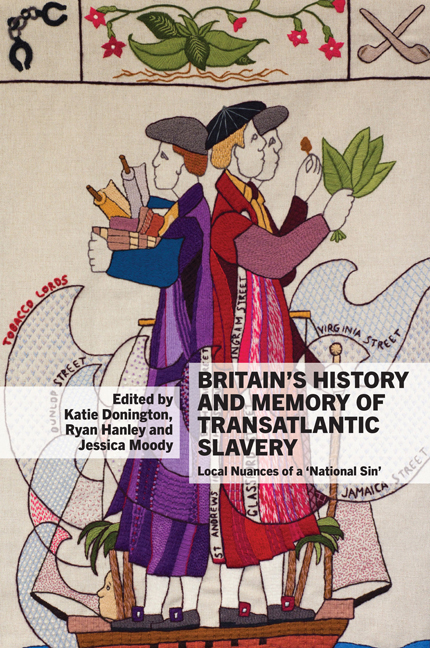Book contents
- Frontmatter
- Contents
- List of Illustrations
- Acknowledgements
- Contributors
- Introduction
- I Little Britain's History of Slavery
- II Little Britain's Memory of Slavery
- 6 Whose Memories? Edward Long and the Work of Re-Remembering
- 7 Liverpool's Local Tints: Drowning Memory and ‘Maritimising’ Slavery in a Seaport City
- 8 Local Roots/Global Routes: Slavery, Memory and Identity in Hackney
- 9 Multidirectional Memory, Many-Headed Hydras and Glasgow
- 10 Making Museum Narratives of Slavery and Anti-Slavery in Olney
- Afterword
- Selected Bibliography
- Index
- Plate section
9 - Multidirectional Memory, Many-Headed Hydras and Glasgow
from II - Little Britain's Memory of Slavery
- Frontmatter
- Contents
- List of Illustrations
- Acknowledgements
- Contributors
- Introduction
- I Little Britain's History of Slavery
- II Little Britain's Memory of Slavery
- 6 Whose Memories? Edward Long and the Work of Re-Remembering
- 7 Liverpool's Local Tints: Drowning Memory and ‘Maritimising’ Slavery in a Seaport City
- 8 Local Roots/Global Routes: Slavery, Memory and Identity in Hackney
- 9 Multidirectional Memory, Many-Headed Hydras and Glasgow
- 10 Making Museum Narratives of Slavery and Anti-Slavery in Olney
- Afterword
- Selected Bibliography
- Index
- Plate section
Summary
Lords, in this tartan tale, tobacco hogsheads
stink clinging to their cloaks,
scarlet smoke wisps, curling through […]
Glasgow's streets where
questions of Empire still smoulder.
Dorothea Smartt, ‘Smouldering On’Introduction
In September 2013, an elaborate work of public art was unveiled. The Great Tapestry of Scotland seeks to ‘tell our nation's story’ from ‘pre-history to modern times’; it has made national tours, has hung at the Scottish Parliament and will form the central tourist attraction for a multi-million-pound railway line to Tweedbank in the Borders. Two particular panels in the tapestry capture the current ambivalent position of slavery – half-submerged/half-emerged – in the collective, public and official national memory of Scotland. In the first panel, titled ‘Scotland and the Drive for Empire,’ slavery, in which ‘the involvement of many Scots […] cannot be ignored,’ features beside the expansion of the Hudson Bay Company and the East India Company. Yet the conventional image of bound and bowed Africans on the Middle Passage maintains African passivity, while its circumscription more fully into Scottish national memory. Indeed, this missed opportunity is witnessed most strikingly in the second panel devoted to the eighteenth century merchants known as the Glasgow Tobacco Lords (see Image 9.1).In keeping with the traditional ideological role of tapestries to represent a glorious and victorious narrative of development, the panel shows three tobacco lords towering above an ocean ship; Glasgow streets which carry their names and achievements are stitched through their fine cloaks and curl through the Atlantic winds. Remarkably, however, the emblem in the top left corner represents manacles – associated with the infamous iconography of abolitionist campaigns – while a brown face seems to grow out of the toe of one of the tobacco lords. Yet, the accompanying text makes no mention of slavery; instead it admires that, following the American War of Independence, ‘Glasgow's canny merchants turned their attention to sugar in the West Indies.’ This seems symptomatic of slavery's lack of integration into Scottish national memory: slavery is present yet absent, banished quite literally to the margins of the story, unexplained and unexplored, yet never quite fully disappearing.
Information
- Type
- Chapter
- Information
- Britain's History and Memory of Transatlantic SlaveryLocal Nuances of a 'National Sin', pp. 195 - 215Publisher: Liverpool University PressPrint publication year: 2016
